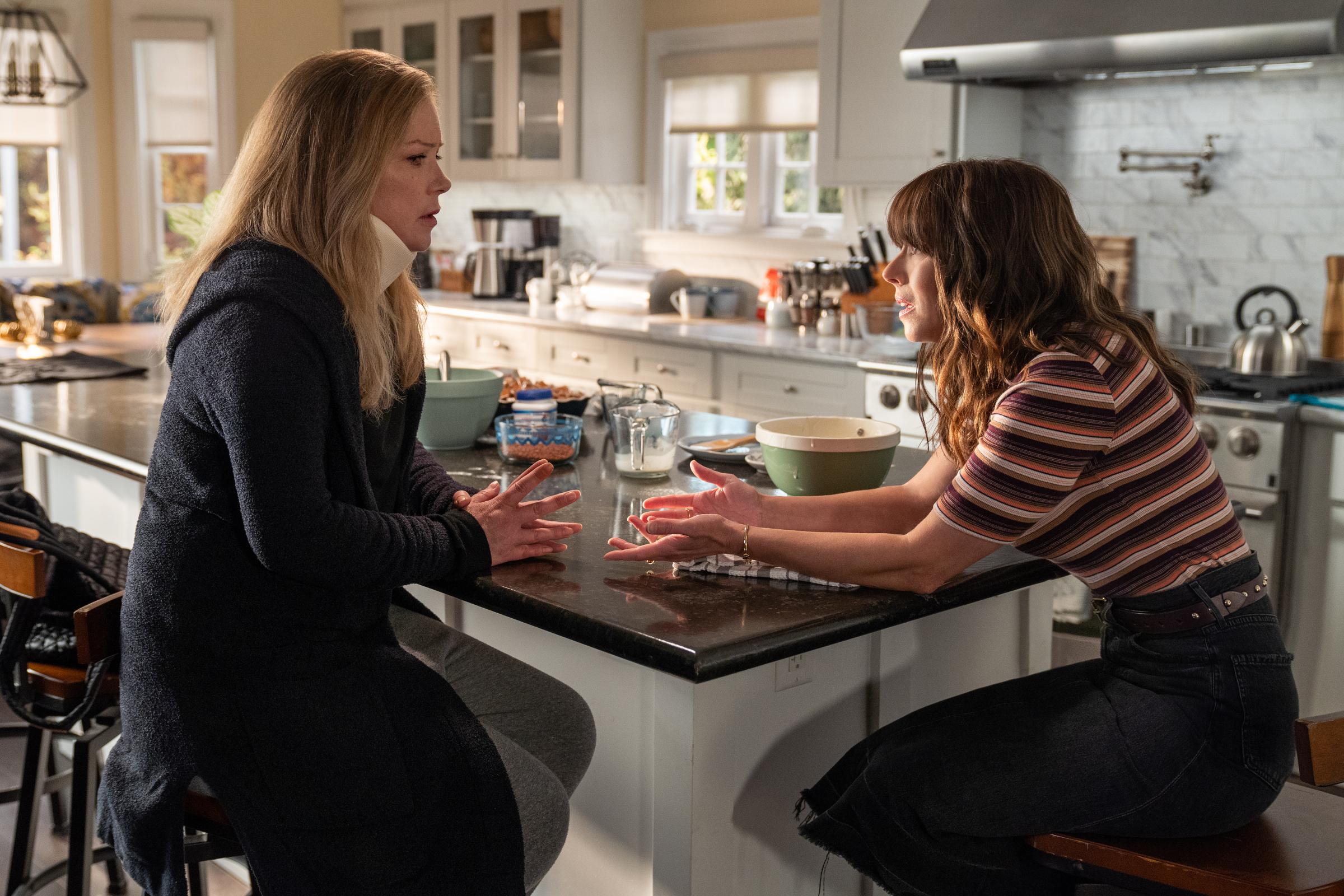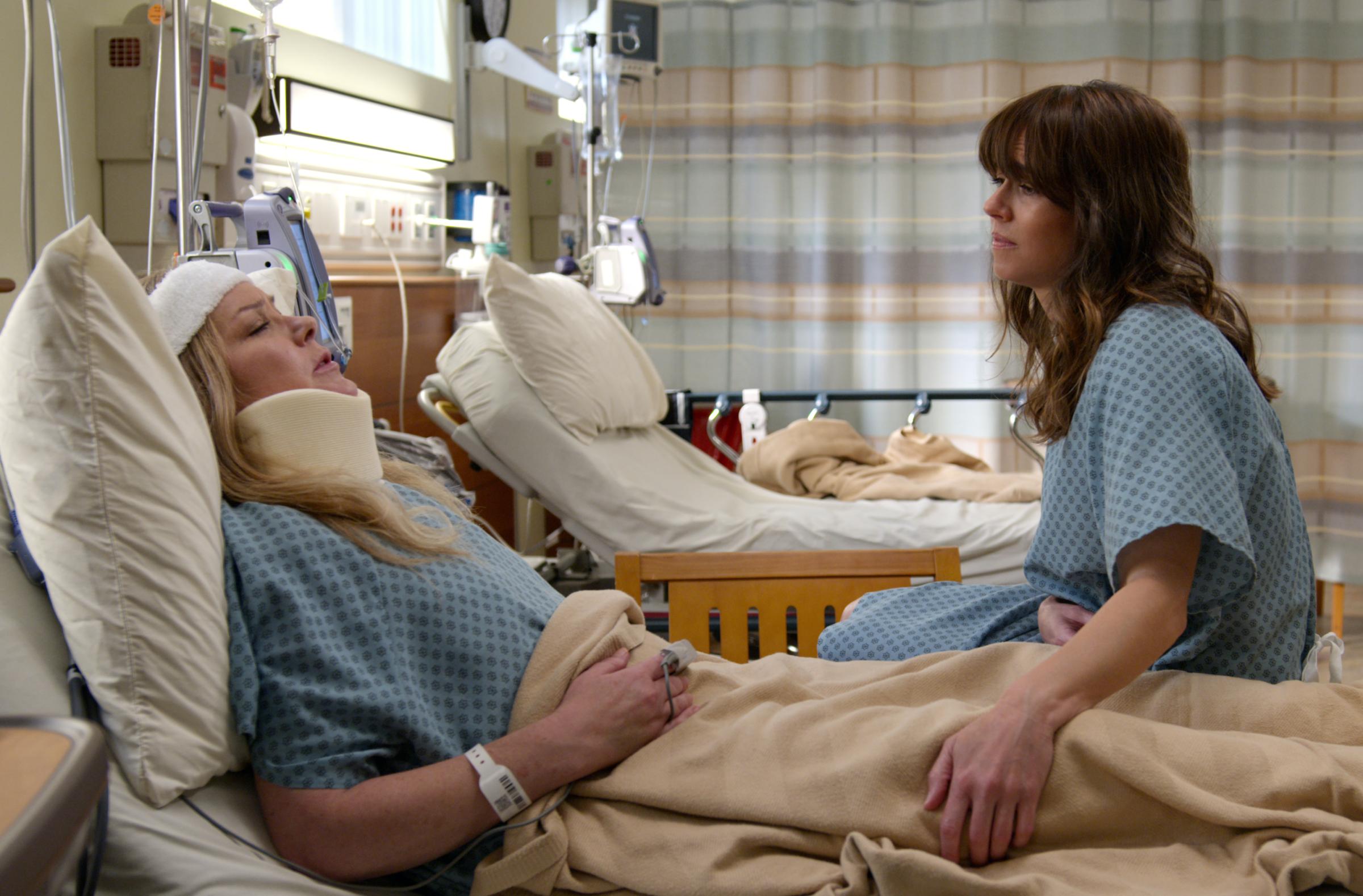Spoiler alert: this article discusses major plot points from the series finale of Dead to Me
Black comedy can be a pitiless art, wringing laughs from the pain of characters who can’t stop compounding their own mistakes. At first, Netflix’s Dead to Me looked to be an especially brutal example of the form. Christina Applegate’s Jen Harding, a Laguna Beach real estate agent and the mother of two boys, is reeling in the aftermath of her husband Ted’s hit-and-run death when she meets Judy Hale (Linda Cardellini), a nurturing bohemian type, at a grief support group. Now prone to fits of rage, Jen lashes out when the group’s conversation turns to forgiveness. “How do you forgive someone who hits your husband with their car and then drives away, leaving him to bleed to death on the side of the road?” she demands. “How do you forgive that?”
She’s about to find out, because Judy and her ex-fiancé Steve (James Marsden)—who Judy had said died in order to join the grief group—were in the car that killed Ted. By the time Jen learns this terrible secret, the women have become inseparable and Judy has moved into Jen’s guest house. The revelation blows up their friendship, of course. But then Jen shoots the real, obnoxious Steve; he dies in her pool; and Judy’s back in the picture. The plot becomes cyclical from there, rotating through the many crimes and cover-ups, lies and confessions, of these flawed but well-meaning women. At times, it’s been hard to imagine where creator Liz Feldman’s 100-car pileup of ironies could be leading. But in its third and final season, Dead to Me resolves into something much more optimistic than it initially appeared to be. It’s still a show that cackles in the face of murder and deception. More than that, though, it’s a love story.
I’m not talking about romance in the traditional sense, although the show’s final scene does paint a picture of Jen and her kids living happily ever after—or, at least, happily until the next devastating revelation—with Steve’s kind, corny, self-destructively grieving twin brother, Ben (also played by Marsden). The core bond is the one that grows, in fits and starts and wild blow-ups and tearful reconciliations, between Jen and Judy. Each woman has a long list of good reasons to hate the other. Instead, everything they’ve learned about each other finally fosters a sort of radical, mutual acceptance. Jen knows that Judy has done awful things, and vice versa, but they’ve also come to trust each other’s motivations. Which is crucial because it provides a peace of mind that neither character is getting from a romantic partner or parental figure.

To transform into a warmer version of itself, Dead to Me had to become a tragedy—one that contrasts the sudden, macabre ends met by cheating Ted and cruel Steve with poor Judy’s slow, painful death from cancer. It navigated that transition with care, putting the writing on the wall through references to mournful pop-culture touchstones from Beaches to “Seasons in the Sun” to the classic children’s book Sadako and the Thousand Paper Cranes and its inspiration, Sadako Sasaki. Even Love Story, that quintessential weepy about young love and untimely death, got a shout out. All of it helped lay the groundwork for an ending that resonated as more than just another crazy twist.
The finale finds Jen and Judy driving to the late Steve’s beachfront getaway in Mexico. Judy is on the run, sort of, after selflessly confessing to the murder Jen committed. Happily, their problems with the cops, the FBI, the Greek mafia, and more get resolved quickly and, in large part, offscreen. The workings of the criminal justice system were never Dead to Me’s strong suit or main concern, and the investigator characters don’t get much in the way of a send-off. In fact, you could say the same about most of the supporting cast, from Jen’s frequently exasperated older son, Charlie (Sam McCarthy), to Judy’s sometime love interest, Michelle (Natalie Morales), who returns for a brief arc in season 3. The show’s limited interest in anyone besides Jen, Judy, and eventually Ben can be a bit disappointing. But the empathy and authenticity it brings to its two leads’ final weeks together make it hard to complain much about the trade-off.
That Jen has evolved into a person capable of forgiveness is apparent when she and Judy unexpectedly find the car that killed Ted in the garage of Steve’s vacation home. “It’s OK to hate it,” Judy says, offering her friend a golf club to “smash the sh-t” out of the vehicle if she wants. “How could I hate it?” Jen replies. “It brought me to you.” They embrace, and it’s the kind of mushy moment that the women might have mocked together back in season 1. A lot of hugging and sobbing happens in this finale. None of it grates, though, in part because Applegate and Cardellini have such wonderful friend-chemistry, in part because the characters have been through so much together—and also in part because, to the very end, their banter remains as salty as it is sweet. Enumerating her regrets during the drive to Mexico, Judy wonders aloud: “Why didn’t I have sex with everybody, constantly?” “Herpes,” Jen mutters, under her breath.

Midway through the season, Judy tells Francine, the woman who administers her chemo, that she can’t have kids. “I didn’t get chosen,” she sighs. “Maybe you got chosen for something else,” says Francine. She’s right. Judy was chosen, by Feldman at least, to do the very thing she set out to do in befriending the widow of the man she accidentally helped kill: make a positive difference in Jen’s life. By the time she vanishes into the sea, after assuring Jen that “You’re not leaving me; I’m staying,” Judy hasn’t just made Jen a more tender, less anger-driven person. She has also, serendipitously, brought Jen together with Ben, who happens to be the father of Jen’s late-in-life daughter-to-be. One of her last acts is to encourage Jen to tell Ben—in prison at the time for a hit-and-run that closed out Season 2—about the baby and make sure she grows up knowing her father.
This is all moving stuff. (The fact that Applegate was diagnosed with multiple sclerosis while shooting the season, along with the close bond she and Cardellini developed over years of working together, further heightens the story’s poignancy.) Whatever the future holds for Jen, it will be shaped by Judy’s optimism. But Dead to Me wouldn’t be Dead to Me if it didn’t also leave us with bracing hints of cynicism and uncertainty. “Why didn’t you name her Judy?” a blunt grief-group regular demands, months after Judy’s death, when she meets baby Joey. “Because that would be weird, Linda,” Jen deadpans. Then there’s the very last, picture-perfect scene. Jen and Ben lounge poolside, as the baby naps and her brothers splash around in the water. One huge loose end remains untied: Ben still doesn’t know that the woman he loves killed his brother. “Ben,” says Jen, a note of dread entering her voice. “I have to tell you something.”
It’s the final line of the show. I didn’t predict it, but as soon as the words came out of Applegate’s mouth and the credits started to roll, it felt obvious that this was the only possible ending. We had to return to the refrain that had shaken up so many relationships over the course of three seasons. Just as Jen’s bluster and Judy’s cheer counterbalanced one another, it was the combination of sweetness and pith that made Dead to Me such a twisted delight.
More Must-Reads from TIME
- Cybersecurity Experts Are Sounding the Alarm on DOGE
- Meet the 2025 Women of the Year
- The Harsh Truth About Disability Inclusion
- Why Do More Young Adults Have Cancer?
- Colman Domingo Leads With Radical Love
- How to Get Better at Doing Things Alone
- Michelle Zauner Stares Down the Darkness
Contact us at letters@time.com